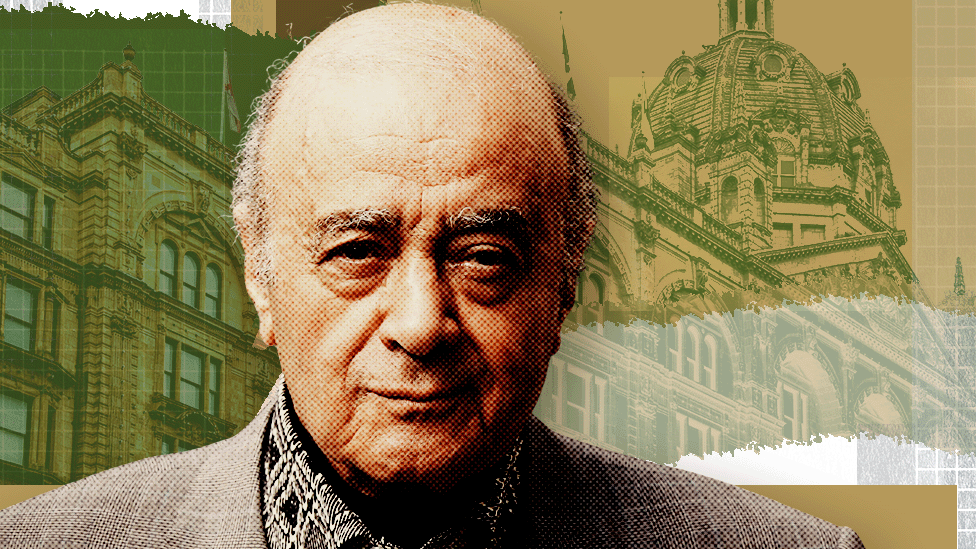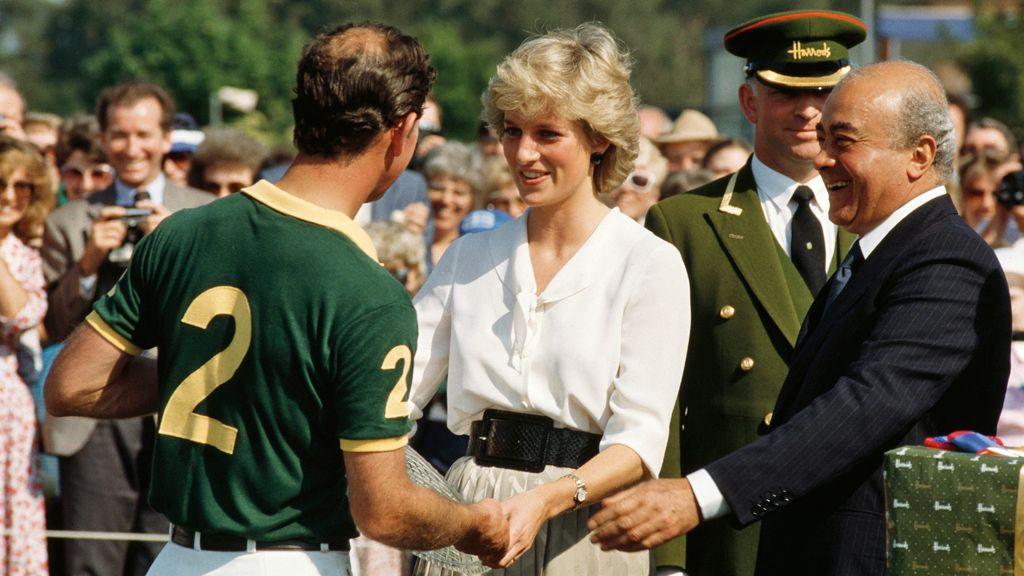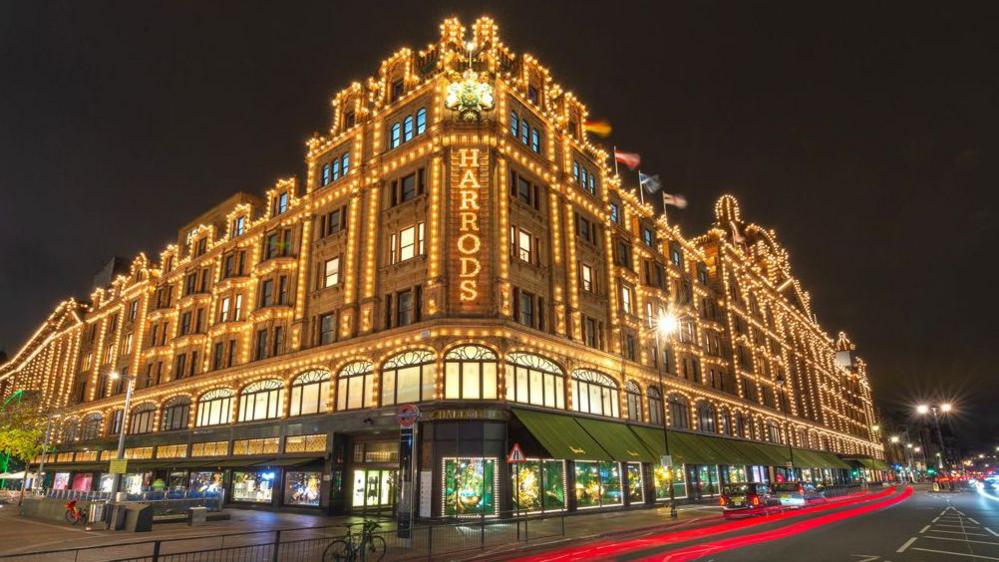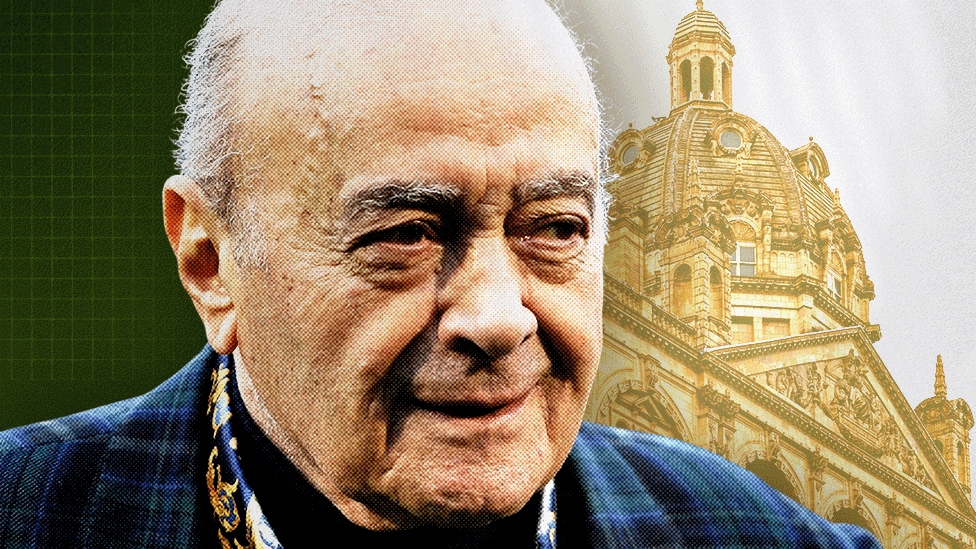Mohamed Al Fayed accused of multiple rapes by staff

- Published
Five women say they were raped by former Harrods boss Mohamed Al Fayed when they worked at the luxury London department store.
The BBC has heard testimony from more than 20 female ex-employees who say the billionaire, who died last year aged 94, sexually assaulted or raped them.
The documentary and podcast - Al-Fayed: Predator at Harrods - gathered evidence that, during Fayed’s ownership, Harrods not only failed to intervene, but helped cover up abuse allegations.
Harrods’ current owners said they were “utterly appalled” by the allegations and that his victims had been failed - for which the store sincerely apologised.
“The spider’s web of corruption and abuse in this company was unbelievable and very dark,” says barrister Bruce Drummond, from a legal team representing a number of the women.
Since this article was first published, more former Harrods employees have contacted the BBC saying Mohammed Al Fayed assaulted them.
Warning: this story contains details some may find distressing.
The incidents took place in London, Paris, St Tropez and Abu Dhabi.
“I made it obvious that I didn't want that to happen. I did not give consent. I just wanted it to be over,” says one of the women, who says Fayed raped her at his Park Lane apartment.
Another woman says she was a teenager when he raped her at the Mayfair address.
“Mohamed Al Fayed was a monster, a sexual predator with no moral compass whatsoever,” she says, adding that all the staff at Harrods were his “playthings”.
“We were all so scared. He actively cultivated fear. If he said ‘jump’ employees would ask ‘how high’.”
Fayed faced sexual assault claims while he was alive, but these allegations are of unprecedented scale and seriousness. The BBC believes many more women may have been assaulted.
'Fayed was vile'
Fayed's entrepreneurial career began on the streets of Alexandria, Egypt, where he hawked fizzy drinks to passers-by. But it was his marriage to the sister of a millionaire Saudi arms dealer that helped him forge new connections and build a business empire.
He moved to the UK in 1974 and was already a well-known public figure when he took over Harrods in 1985. In the 1990s and 2000s, he would regularly appear as a guest on prime-time TV chat and entertainment shows.
Meanwhile, Fayed - whose son Dodi was killed in a car crash alongside Diana, Princess of Wales, in 1997 - has become known to a new generation through the two most recent Netflix series of The Crown.

Fayed had courted the Royal Family for years
But the women we have spoken to say his portrayal as pleasant and gregarious was far from the truth.
“He was vile,” says one of the women, Sophia, who worked as his personal assistant from 1988 to 1991. She says he tried to rape her more than once.
“That makes me angry, people shouldn't remember him like that. It's not how he was.”
Some of the women waived, or partially waived, their right to anonymity to be filmed - and the BBC agreed not to use surnames. Others chose to remain anonymous. Put together, their testimonies reveal a pattern of predatory behaviour and sexual abuse by Fayed.
The Harrods owner would regularly tour the department store's vast sales floors and identify young female assistants he found attractive, who would then be promoted to work in his offices upstairs - former staff, male and female, told us.
The assaults would be carried out in Harrods’ offices, in Fayed's London apartment, or on foreign trips - often in Paris at the Ritz hotel, which he also owned, or his nearby Villa Windsor property.
At Harrods, other former staff members told us it was clear what was happening.
“We all watched each other walk through that door thinking, ‘you poor girl, it's you today’ and feeling utterly powerless to stop it,” Alice, not her real name, says.
'He raped me'
Rachel, not her real name, worked as a personal assistant in Harrods in the 1990s.
One night after work, she says she was called to his luxury apartment, in a large block on Park Lane overlooking London's Hyde Park. The building was protected by security staff and had an on-site office staffed by Harrods employees.
Rachel says Fayed asked her to sit on his bed and then put his hand on her leg, making it clear what he wanted.
“I remember feeling his body on me, the weight of him. Just hearing him make these noises. And… just going somewhere else in my head.
“He raped me.”
The BBC has spoken to 13 women who say Fayed sexually assaulted them at 60 Park Lane. Four of them, including Rachel, say they were raped.
Sophia, who says she was sexually assaulted, described the whole situation as an inescapable nightmare.
“I couldn't leave. I didn’t have a [family] home to go back to, I had to pay rent,” she says. “I knew I had to go through this and I didn’t want to. It was horrible and my head was scrambled.”
Watch: “Everything was shredded in front of us… tapes… nasty voicemails,” says Gemma
Gemma, who worked as one of Fayed’s personal assistants between 2007-09, says his behaviour became more frightening during work trips abroad.
She says it culminated in her being raped at Villa Windsor in Paris's Bois de Boulogne - a former home, post-abdication, of King Edward VIII and his wife Wallis Simpson.
Gemma says she woke up startled in her bedroom. Fayed was next to her bed wearing just a silk dressing gown. He then tried to get into bed with her.
“I told him, ‘no, I don't want you to’. And he proceeded to just keep trying to get in the bed, at which point he was kind of on top of me and [I] really couldn't move anywhere.
“I was kind of face down on the bed and he just pressed himself on me.”
She says after Fayed raped her she cried, while he got up and told her aggressively to wash herself with Dettol.
“Obviously he wanted me to erase any trace of him being anywhere near me,” she explains.
Eight other women have also told us they were sexually assaulted by Fayed at his properties in Paris. Five women described the assaults as an attempted rape.

A BBC investigation into allegations of rape and attempted rape by Mohamed Al Fayed, the former owner of Harrods. Did the luxury store protect a billionaire predator?
Watch Al-Fayed: Predator at Harrods on BBC iPlayer now or on BBC Two at 21:00 on Thursday 19 September.


Listen to World of Secrets, Season 4: Al Fayed, Predator at Harrods on BBC Sounds. If you’re outside the UK, you can listen wherever you get your podcasts, external.

'Open secret'
“The abuse of women, I was aware of it when I was on the shop floor," says Tony Leeming, a Harrods department manager from 1994 to 2004. It “wasn't even a secret”, recalls Mr Leeming, who says he did not know about more serious allegations of assault or rape.
"And I think if I knew, everybody knew. Anyone who says they didn't are lying, I'm sorry".
Mr Leeming's testimony is backed up by former members of Fayed's security team.
“We were aware that he had this very strong interest in young girls,” says Eamon Coyle, who joined Harrods in 1979 as a store detective, then became deputy director of security from 1989-95.
Meanwhile Steve, who does not want us to use his surname, worked for the billionaire between 1994-95. He told us that security staff “did know that certain things were happening to certain female employees at Harrods and Park Lane”.
Many of the women told us that when they began working directly for Fayed they underwent medicals - including invasive sexual health tests carried out by doctors.
This was presented as a perk, the women told us, but many did not see their own results - even though they were sent to Fayed.
“There is no benefit to anybody knowing what my sexual health is, unless you're planning to sleep with somebody, which I find quite chilling now,” says Katherine, who was an executive assistant in 2005.
'Culture of fear'
All the women we spoke to described having felt intimidated at work - which had made it difficult for them to speak out.
Sarah, not her real name, explained: “There was most definitely a culture of fear across the whole store - from the lowliest of the low, to the most senior person.”
Others told us they believed the phones in Harrods had been tapped - and that women had been scared of talking to each other about Fayed’s abuse, fearing they were being filmed by hidden cameras.
The ex-deputy director of security, Eamon Coyle, confirmed this - explaining how part of his job was to listen to tapes of recorded calls. Cameras that could record had also been installed throughout the store, he said, including in the executive suites.
“He [Fayed] bugged everybody that he wanted to bug.”
Harrods told the BBC in a statement these had been the actions of an individual “intent on abusing his power” which it condemned in the strongest terms.
It said: “The Harrods of today is a very different organisation to the one owned and controlled by Al Fayed between 1985 and 2010, it is one that seeks to put the welfare of our employees at the heart of everything we do.”

Harrods' new owners started settling claims with Fayed's victims in 2023
There were a number of attempts to expose Fayed before his death - notably by Vanity Fair in 1995 - with an article alleging racism, staff surveillance and sexual misconduct. This sparked a libel lawsuit.
Mohamed Al Fayed later agreed to drop the case as long as all the further evidence the magazine had gathered of his sexual misconduct in preparation for a trial was locked away. Fayed’s settlement was negotiated by a senior Harrods executive.
In 1997, ITV’s The Big Story reported further serious allegations including sexual harassment and groping - which is classed as sexual assault.
One of the women in the BBC investigation, Ellie, not her real name, was 15 in 2008 when she reported an assault to the police - an allegation that made headlines - but did not result in any charge.
In 2017, Channel 4’s Dispatches broadcast allegations of groping, assault and harassment, with one woman waiving her right to anonymity for the first time. It gave some women the courage to come forward - and was followed by a 2018 investigation on Channel 4 News.
But it is only now, with Mohamed Al Fayed having died last year, that many of the women have felt able to speak publicly about rape and attempted rape.
Cash and NDAs
The BBC documentary reveals that, as part of Gemma's settlement in 2009, she had to sign a non-disclosure agreement (NDA), a legally-binding contract which ensures information remains confidential.
She says after she was raped, she contacted a lawyer who told Harrods she was leaving her job on the grounds of sexual harassment. Gemma says she did not feel able, at that time, to disclose the full extent and seriousness of Fayed's assaults.
Harrods agreed she could leave and it would pay a sum of money in exchange for her shredding all evidence and signing an NDA. Gemma says a member of Harrods’ HR team was present as the shredding took place.
The BBC has heard that women were threatened and intimidated by Harrods' then-director of security, John Macnamara, to stop them speaking out.
Fourteen of the women we spoke to recently brought civil claims against Harrods for damages. The shop's current owners, who are not asking women to sign NDAs, started settling these in July 2023.
It took Sophia and Harrods five years to reach an agreement. In her case, the store expressed regret but did not admit liability. Many more women are now considering legal action against Harrods.
The barristers representing some of the women we spoke to - Bruce Drummond and Dean Armstrong KC - argue the store was responsible for an unsafe system of work.
“Any place of work has a duty to ensure the safety of its employees. Without question, the company failed these ladies,” says Mr Drummond.
“That’s why we step in. Because they just did nothing to actually prevent this. They did the opposite. They enabled it.”
Mr Armstrong adds: “We say there have been clearly attempts by the senior people at Harrods to sweep this under the carpet.”
Many more women are now considering legal action against Harrods.
Barrister Maria Mulla - who is also on the legal team representing some of the women - says clients are coming forward now, because previously they have been “absolutely petrified” to speak out.
“They want to be part of this movement of holding people accountable for what has happened to them, and trying to make sure these things don't happen again in the future for their own children and for their children.”
Harrods told the BBC: “Since new information came to light in 2023 about historic allegations of sexual abuse by Al Fayed, it has been our priority to settle claims in the quickest way possible. This process is still available for any current or former Harrods employees.
“While we cannot undo the past, we have been determined to do the right thing as an organisation, driven by the values we hold today, while ensuring that such behaviour can never be repeated in the future.”
The Ritz hotel in Paris said it “strongly condemns all forms of behaviour that do not align with the values of the establishment”.
When Fayed died, unconfirmed reports estimated his worth in excess of £1bn. But money is not the motivation for the women to speak out, they say.
“I’ve spent so many years being quiet and silent, not speaking up,” says Gemma, “and I hope talking about it now helps. We can all start feeling better and healing from it.”
Get in touch
Have you been affected by this story?
- Published19 September 2024
